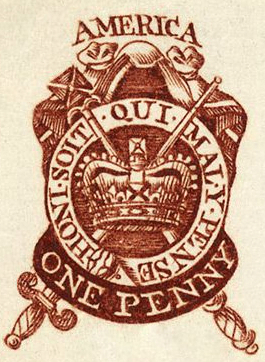The Stamp Act, instated by Parliament in 1765, was the first internal tax added to the cost of products, paper goods, including newspapers, almanacs, legal documents, diplomas, playing cards, dice, and marriage certificates. The act was poorly timed, imposed during an economic depression of rampant unemployment, inflation, and poverty. British mercantile houses withheld credit for businesses in New York and called in debts from tradesmen and shopkeepers, creating a ripple effect on artisans and farmers. With an influx of cheap clothing and furniture from England’s overstocked warehouses, local artisans and businesses found it more and more difficult to compete. As domestic purchasing declined, colonial currency lost its value. Shops closed, merchants went bankrupt, and laborers lost their work and wages. The recently built New Gaol [Jail] in today’s City Hall Park became a debtors’ prison occupied by many of those affected by the depression. A New Yorker at the time remarked that “trade in this part of the world is come to so wretched a pass that you would imagine the plague had been here.”[i] The Stamp Act not only set a precedent for adding a tax on top of the cost of goods but most flagrantly violated the British constitutional precept of “no taxation without representation.”[ii] In defiance, the newly formed Sons of Liberty advocated for a nonimportation pact among the colonists until the tax was repealed. Nine of the thirteen colonies met at the old City Hall on Wall Street in October 1765, in what was called the Stamp Act Congress, and agreed to halt the import of British goods until the act was repealed:
At a general Meeting of the Merchants of the City of New-York, trading to Great-Britain…they came to the following Resolutions…That in all Orders they send out to Great-Britain, for Goods or Merchandize, of any Nature, Kind of Quality whatsoever, usually imported from Great-Britain, they will direct their Correspondents not to ship them, unless the Stamp Act be repealed.[iii]
[i] Edwin G. Burrows and Mike Wallace, Gotham: A History of New York City to 1898, (New York: Oxford University Press, 1988), 192.
[ii] Burrows and Wallace, Gotham, 198.
[iii] “No stamped paper to be had,” Philadelphia: Printed by Hall & Franklin. Philadelphia, 1765, Library of Congress, https://www.loc.gov/item/98160405 (accessed March 5, 2020).










